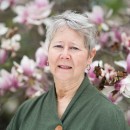
After 13 years at the School of Social Work, Su Crabb is retiring. Crabb first came to U-M through a temporary staff position.. At the time, she had recently left a non-profit in Washtenaw county after serving as executive director and was looking for a new job and expanded opportunities. “I saw a temporary position being posted, really not knowing what the job required, but I quickly hurried up and walked my application to Mary Ruffalo and was interviewed by Betsy Voshel for a temporary summer position and I was hired.”
She didn’t realize it at the time, but this choice would eventually lead to an offer for a full-time position at the School of Social Work from Voshel in the Office of Field Education. “So, I was hired into a full-time position. I became the sixth field educator and started with 50 students. That’s how it all began.”
Crabb has studied therapeutic recreation, physical education, social work and interdisciplinary teacher education. Before joining the Office of Field Education and the nonprofit sector, Crabb worked at the intersection of physical education and youth counseling. She was interested in how helping youth who have experienced trauma reach physical developmental milestones might help them develop social skills and psychological coping mechanisms. “So, the connection between physical education and social work is that our physical bodies really impact how we think and how we cognitively move forward in the world.'' Despite the challenges of sexism and ageism, Su Crabb has been consistently offered opportunities to lead and exercise authority during her career. These experiences nurtured an interest in management. “I have also always been interested in management and so as I progressed in my career, I had positions of increasing responsibility and authority and was moving up in management and doing things and read a lot and took advantage of continuing education around leadership.”
Crabb ended up becoming the assistant director of the Office of Field Education under Director Dan Fisher. She has been instrumental in changing the placement process. “I have been doing this work for quite some time. My peers tend to come to me and say, ‘Here is my problem, can we talk this through?’”
Crabb’s career has been dedicated to teaching, problem solving, student mentorship and engagement and collaboration. She is a consummate collaborator. “I like to collaborate. I think that two brains are better than one and three brains are even better. You get twelve brains in the room and you got chaos, it could be controlled chaos. Still, you will reach a great solution to your problem with twelve brains.” She developed a Women in Leadership Class with Clinical Assistant Professor and MSW Program Director Barb Hiltz. “This class and the collaboration within the school of social work that I leave as a legacy.” During her tenure, she was often consulted in formal and informal contexts to help identify solutions and opportunities. “I have had people throughout the school come to my door and knock on my door and talk about things with me with respect to problem solving.”
Crabb’s own retirement is bittersweet. “I gave the graduation talk for the JCLP students. It was amazing and heartfelt. The connection with everyone is what I am going to miss.” She will miss the team; indeed, the family at the School of Social Work. “This is not a job; this is a vocation – maybe even an avocation perhaps. I have never felt like going to work. I absolutely enjoy 99% of what I do in the Office of Field Education. I love working with the students, I love problem solving.”